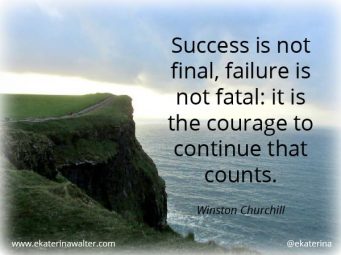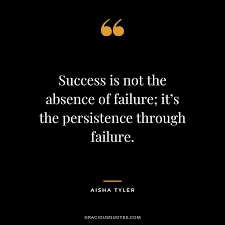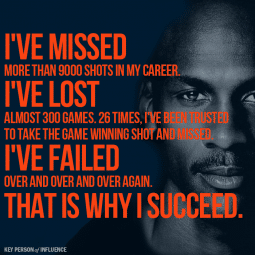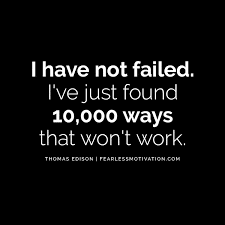From the tiniest to the biggest task that we handle, whether we succeed or we fail, is the biggest ‘unknown’ we are very eager to know, even before we start. We would rather not take up the task, put in tons of effort and wait for the result only to realise that we going to fail at the end.

In a talk I heard recently, I realised there is a simple way to understand the subtle difference between success and failure and how failure can be converted into success :
Failure makes you discontinue, stop and give up. Success makes you continue and move forward. The day we fail and decide that we are not giving up and we continue, it will convert to success. It’s that simple. The failure is termed as a failure, because we give up. But the day we term it a temporary bump in the road, we will consider making some minor adjustment in our approach, move on and finally succeed.

The key characteristic that becomes important to ensure success is patience. We invariably give ourselves lot lot less time to succeed, than what the task demands. Call it overconfidence or incomplete knowledge on the task at hand or maybe competitive pressure in some cases, but not only we want to task to be completed, we want to complete it FAST. And in the haste, we invariably make mistakes, we ignore some details and then repent it when we have a failure. At that point, we are not able to think clearly and do not realise that we might have failed due to some key points not having been accounted for. Doing a review/look-back can easily identify the problem and we can course correct. Then again, some cases, the mistake is fatal and only way for us to succeed is to start all over from scratch. Not many would be open for that option.

The other key element that is crucial for success is knowledge. Being completely aware of the task on hand and what it entails to succeed, before taking up the task, can be super-critical. Many times, we believe in ‘on the job learning’ which might work in some cases, but most of the cases, its not advisable. If we have the knowledge in advance, then we can plan much better, gather all the requisite resources and start with a clear idea on precise amount of time and effort that will be needed to succeed.

If there is one story of failure that I would like to quote, it is this one:
- Very soon after the writer started writing, the writer was pulled away from work by the devastating death of her mother.
- She ceased working on the book and sank into a deep, grieving depression, getting little to nothing accomplished in that time.
- In the hopes of digging herself out of grievance, she took a job teaching English in Portugal for a year. Things did not go as planned.
- Not only did she fail to make progress on her first book, but after falling in, and then out of, love, she ended up with a failed marriage and a baby daughter she now had to raise alone.
- She had no job, no finished product and two mouths to feed. She had hit rock bottom. As she struggled with depression, raising a child on her own and living off meagre unemployment benefits, she resumed work on her book in cafes while her daughter was asleep.
- Despite numerous setbacks, she found solace in doing what she loved – writing.
- When she finished the first three chapters, she sent the manuscript off to a publisher – They quickly passed on the project.
- She sent it to another publisher. Again, the answer was no. Her mailbox filled up with rejection letters, but she didn’t let it stop her.
- After sending her manuscript to 12 different publishers and getting rejected by every single one, Rowling began losing confidence in her book.
- Finally, the editor at Bloomsbury Publishing company sat down to read the manuscript. And so did the editor’s 8-year-old daughter. The little girl loved the opening chapters and begged to read the whole thing. This made the publisher agree to publish Rowling’s novel.
- Rest, as they say, is history. The author’s book series has been translated into 73 languages, sold millions of copies and accrued over $20 billion through movie adaptations and sponsorships.
- In her own words:
“Failure meant a stripping away of the inessential. I stopped pretending to myself that I was anything other than what I was, and began to direct all my energy into finishing the only work that mattered to me.” –
— J.K. Rowling
In the end, I would only say this, the boundaries between success and failure are not so well defined, simply because they are indistinguishable to the positive minded person. There is no shame in failure, just like one need not have too much pride in success, because both are impermanent.
“The real test is not whether you avoid this failure, because you won’t. It’s whether you let it harden or shame you into inaction, or whether you learn from it; whether you choose to persevere.”
— Barack Obama









Comments & Discussion
11 COMMENTS
Please login to read members' comments and participate in the discussion.